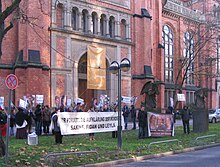Sakine Cansız
Sakine Cansız (* 1958 in Tunceli , Turkey ; † January 9, 2013 in Paris , France ) was a founding and leading member of the Kurdistan Workers' Party .
Life
Sakine Cansız was born to Zeynep and İsmail Cansız. The family had eight children. Sakine had two sisters and five brothers. She attended elementary school, middle school and high school in the provincial capital.
According to their own statements, they particularly influenced the political and violent clashes of the 1970s; the fate of Deniz Gezmiş and the event of Kızıldere . Then there was the repression in her home country. After school, Cansız went to Ankara, where he met Kesire Yıldırım , who would later become the wife of Abdullah Öcalan , and the PKK co-founder Ali Haydar Kaytan . Before joining the PKK, Sakine Cansiz was married to an engineer and carried the family name Polat. She later divorced. In November 1978, at the age of 20, she founded the PKK in Lice together with Öcalan and others. In 1979 Sakine Cansiz was arrested and sentenced to 24 years in prison for opening a branch of the Kurdistan Workers' Party in Elazig. Sakine Cansız was detained and tortured in Diyarbakir Military Prison. Your brother Metin Cansiz was also in Diyarbakir prison. After her release in 1991, Cansiz took part in the armed struggle of the PKK. From then on, her code name was Sara.
Because of her relationship with Mehmet Şener , she initially fell out of favor. Love relationships were forbidden within the organization and her partner had been declared a traitor because of his opposition to Abdullah Öcalan. The PKK organized the execution of her lover in 1991. In her autobiography, Cansız wrote:
“It was decided at the conference to punish Şener. Sooner or later he should pay for his betrayal. It said nothing more whether he physically continued to exist. "
Sakine Cansız was later sent to Europe. She was granted political asylum in France. In 2007 she was arrested in Hamburg. Turkey had written them out for arrest. She was released a few weeks later due to insufficient evidence.
assassination

She was shot together with Fidan Doğan (* 1982) and Leyla Şaylemez (* 1989, also Söylemez) in Paris. Her death led to major protests by Kurds in Europe and especially in France. Three days after the attack, Ömer Güney was arrested on January 12 and taken into custody. He was later charged with shooting Sakine Cansız, Fidan Doğan and Leyla Şaylemez with gunshots from a silenced pistol. Ömer Güney was found dead in his cell in prison on December 16, 2016, a few weeks before the start of the trial. According to the Paris investigating authorities, the Turkish secret service MIT is said to have been involved in the attack against Cansız. She was buried in her home town of Tunceli .
Autobiography
-
My whole life has been a struggle: 1st volume - teenage years. Mezopotamien Verlag : Neuss 2015, ISBN 978-3-941012-98-1 .
- My whole life has been a struggle: 1st volume - teenage years. New edition, Unrast Verlag , Münster, 2019, Edition Mezopotamya, ISBN 978-3-89771-861-6 .
-
My whole life has been a struggle: Volume 2 - Prison Years. Mezopotamien Verlag: Neuss 2015, ISBN 978-3-945326114 .
- My whole life has been a struggle: Volume 2 - Prison Years. New edition, Unrast Verlag 2019, Edition Mezopotamya, ISBN 978-3-89771-862-3 .
- My whole life has been a struggle: Volume 3 - Guerrilla. Unrast Verlag 2019, Edition Mezopotamya, ISBN 978-3-89771-863-0
Web links
- Portrait on stern.de ( Memento from January 23, 2013 in the Internet Archive )
- Turkish agents are said to be involved in the murders of PKK activists , article on spiegel.de
Footnotes
- ↑ haber.mynet.com
- ^ "Elle voulait que les mères kurdes et turques cessent de pleurer" . In: Liberation.fr . ( liberation.fr [accessed August 21, 2018]).
- ↑ a b Daren Butler: Slain Kurdish activist Cansiz leaves stamp on militant PKK . In: US ( reuters.com [accessed August 3, 2018]).
- ↑ Jörg Diehl, Özlem Gezer, Fidelius Schmid: GEHEIMDIENSTE: "And God preserve" . In: Der Spiegel . tape February 7 , 2014 ( spiegel.de [accessed January 29, 2018]).
- ↑ a b Jörg Diehl, Fidelius Schmid: Secret Services: Turkish agents are said to be involved in the murders of PKK activists . In: Spiegel Online . June 8, 2016 ( spiegel.de [accessed January 29, 2018]).
| personal data | |
|---|---|
| SURNAME | Cansız, Sakine |
| BRIEF DESCRIPTION | Turkish founding member of the PKK |
| DATE OF BIRTH | 1958 |
| PLACE OF BIRTH | Tunceli |
| DATE OF DEATH | January 9, 2013 |
| Place of death | Paris , France |